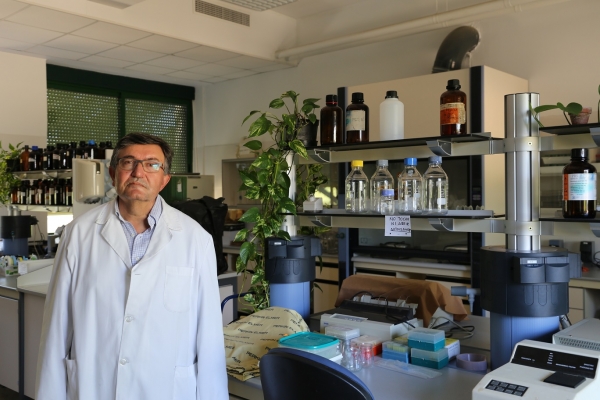The calcareous soils that pervade the southern region of the country pose a challenge for plants: though iron is abundant in the soil, plants are unable to acquire it due to the high pH levels in said soil, making iron only slightly soluble and, therefore, hard to absorb. To tackle this iron deficiency, plants activate a series of responses, such as developing new roots to span more soil or freeing protons to acidify or solubilize iron.
Depending on their needs, plants activate and deactivate these responses by means of a strictly regulated process in which hormones such as ethylene participate actively. Ethylene is also involved in other stress processes like phosphorus deficiency and pathogen attack.
With a lengthy track record of studying responses to iron deficiency that plants carry out, a research team, including Agronomy Professor Francisco Javier Romera at the University of Cordoba, has found a relationship between iron deficiency responses and the response caused by certain beneficial microorganisms, so that the latter can foster iron uptake.
Certain rhizosphere microorganisms (found in contact with the surface of the roots) cause a kind of Induced Systemic Resistance (or ISR) in plants. In other words, the plant detects a certain amount of these kinds of organisms and, perceiving them as enemies, initiates a defense strategy throughout the whole plant (systemic). However, upon perceiving that these organisms are friendly, the defense strategy is blocked but it remains ready to act systemically and rapidly once a real pathogen comes along.
The relationship that exists between this induced systemic resistance (ISR) and the responses to iron deficiency lies in the presence of the ethylene hormone in both processes. As a consequence of the common action of this hormone, proof has been found that applying these rhizosphere microorganisms so benefical to plants can induce responses to iron deficiency and hence, improve the plant’s uptake of iron on land that, like calcareous land, poses quite a challenge in this context.
The challenge for the research team now lies in identifying which species of rhizosphere microorganisms are more effective for each kind of crop and under what kinds of conditions. The biggest issues with iron deficiency facing peach trees and olive trees in the area have become the main research focus for this research group. What is more, the negative effects of calcareous soils are greater in dicots (plants that have two main leaves upon germination) such as tomatoes, green beans, cucumbers and the abovementioned woody crops, meaning they will also benefit from these kinds of studies.
Romera Francisco J., García María J., Lucena Carlos, Martínez-Medina Ainhoa, Aparicio Miguel A., Ramos José, Alcántara Esteban, Angulo Macarena, Pérez-Vicente Rafael. Induced Systemic Resistance (ISR) and Fe Deficiency Responses in Dicot Plants. Frontiers in Plant Science vol. 10 (2019) pag 287 DOI=10.3389/fpls.2019.00287


